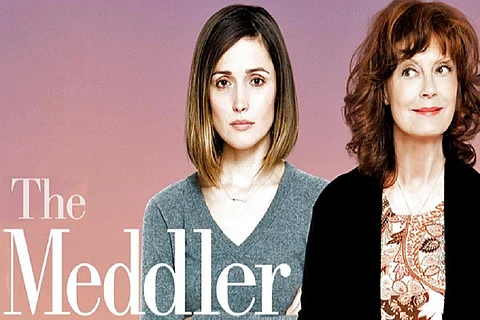

The Meddler, a heartwarming film starring Susan Sarandon that originally released in 2015, has made a grand entry online with an edited version on Netflix. Written and directed by Lorene Scafaria based on her personal experiences, this sitcom style film is a tearjerker that beautifully encapsulates grief, and coping with loss.
Sarandon plays Marnie, an overbearing sixty-something mother, who has moved to Los Angeles from New Jersey for the purpose of being close to her daughter Lori (Rose Byrne). As the plot unveils itself, we see there is more to Marnie’s relocation across the coast than what meets the eye. Marnie is desperately trying to avoid processing the death of her husband Joe, who can only be seen in pictures, and their therapy-seeking screenwriter daughter Lori misses her dad very much too.
While Marnie calls Lori more than a dozen times an hour, Lori struggles to draw a boundary and demand some space to herself. So she goes away for work thus leaving Marnie to find things to do on her own. While Marnie won’t let up on trying to have a stronghold on her daughter’s life, she finds ways to circumvent accosting her directly, through her friends, therapists and Lori’s browser history!
There is a beautiful way in which Lorene Scafaria has broken the fourth wall with the rendezvous between Marnie and the therapist. What she thinks Marnie might be going through is a cold realisation both Marnie and the audience have at the same time. Of course, Marnie denies it. At this point in the film, we start feeling truly sorry for Marnie, and her overbearing nature starts to grow on us. Her husband’s death and a seemingly aloof daughter makes Marnie a philanthropist of sorts where she tries to help absolute strangers and tries to find some meaning to this grief, but in vain.
The film constantly walks on a tightrope with slapstick chuckles on one side, and acute melancholy on the other. Susan Sarandon gets complete credit for managing to strike that profound balance. For a woman actor her age, with all of Hollywood’s asinine ageism, Sarandon has debunked those norms and shines in the film.
The reason this film stands out in the portrayal of grief is not just because it is based on Scafaria’s own experience, but because she has tried to not “cinematize” grief. While there is no one true way of coping with the loss of a loved one, turning it into art seems to have its own humble exuberance. It is the genius of the filmmaker to have included a film about coping within the film. Lori, is shown to make a pilot episode for a television channel, which she uses to tell her own story.
It is interesting the way Lori has turned her painful memories of living with domineering parents, but contrarily, how Marnie sees it as an avenue to resurrect her dead husband. Both equally valid, and inching towards coping in some way. The characters don’t ululate, they share many silences, which I think, adds to the painful realism of the film. The subtle undertones in tragicomic moments boost the grief quotient significantly too. For example, when Marnie goes on to explain in great detail about her name and marital status to Zipper (J.K Simmons), or how Lori has a safe word “cantaloupe” for her mother to stop talking for she might embarrass her at her workplace.
The film comes full circle during this stressful scene where Lori thinks she might be pregnant but the blood results say otherwise. Hysterical laughter ensues when Marnie accidentally gets her an ovulation kit instead of a pregnancy kit. This outburst seems to be the catharsis both have been waiting for. Lori finally admits to missing her dad and wishing for some decisions to be made for her. Both of them laugh at being the black sheep after Joe’s passing, laugh-crying at their own plight. I found this to be sincere and admirable because there is no beauty in coping with grief; it is isolating and often debilitating.
The ceiling fan trope, though used many times in films, has worked well for The Meddler. Marnie, by helping the old woman at the hospital with a dialing phone, finds the purpose to move on and seek happiness. It works almost like an ‘aha’ moment for her. The old woman also acts as a wonderful foreshadow that binds the opening scene to the one towards the end and gives it the closure Marnie needs.
A note of appreciation to Scafaria for writing a wide variety of male characters in the film, and particularly that of Zipper. The outwardly rough and rugged ex-cop who, in fact, is a mushy guitar playing chicken rearer who pines for his daughter. Allowing herself to court Zipper, she finally moves on from Joe. As for the overbearing phone calls to Lori - well, is life really complete if our moms don’t drive us crazy?
Vaishnavi Sundar is a writer and a self-taught filmmaker. Her interests lie in an odd mix of cinema, arts, and all things feminist.